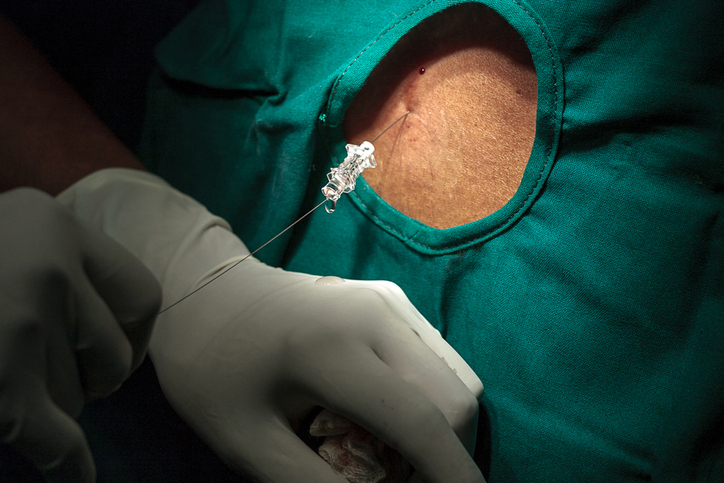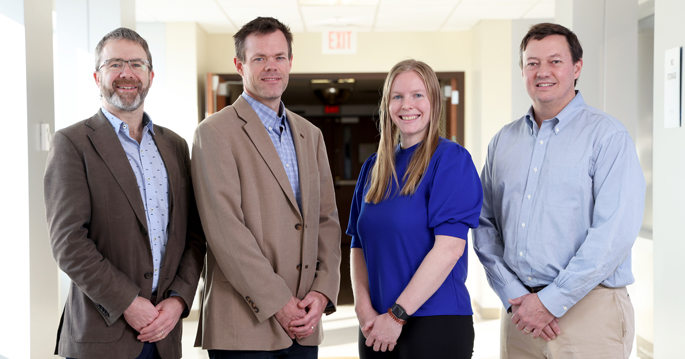Paul Govern
-

Low-flow cerebrospinal fluid in Huntington’s disease: study
Vanderbilt researchers found reduced net flow of cerebrospinal fluid in Huntington’s disease, which could contribute to mutant protein retention and altered responsiveness to medications delivered via the spinal cord. Read MoreSep 7, 2023
-

Alzheimer’s genetic risk tracked across sex, race
A Vanderbilt study of genetic risks for cognitive impairment later in life uses data from 32,426 research participants ages 60 and older to elaborate these risks across sex and across the intersection of sex and race. Read MoreJul 17, 2023
-

Low-professionalism residents later draw higher patient complaints: study
A Vanderbilt study finds a strong association between lower ratings for interpersonal communication skills among medical residents in their last year of training and greater likelihood of unsolicited patient complaints among doctors during their first year of employment after training. Read MoreApr 13, 2023
-

Study links excess oxygen during anesthesia to risk of organ injury
A Vanderbilt study found that higher levels of excess oxygen given to patients under general anesthesia add risk of injury to the kidneys, lungs and heart. Read MoreNov 30, 2022
-

Study explores possible drug target for neurological problems
A team at Case Western Reserve University and Vanderbilt University Medical Center has determined with atomic-level precision how two established drugs bind to and alter the conformation of a cell membrane transporter protein called NKCC1, shutting down its activity. Read MoreNov 3, 2022
-

Study measures Alzheimer’s risk reductions associated with healthy lifestyles
Reported June 13 in Neurology, an Alzheimer’s disease risk study from Vanderbilt University Medical Center measures significantly reduced risk associated with healthy lifestyles, including non-smoking, leisure-time exercise, low-to-moderate alcohol consumption, adequate sleep and healthy diet. Read MoreJun 13, 2022
-

Blood test figures in cancer risk for people with HIV
A Vanderbilt study found that, among adult patients with HIV, those who have lower counts of certain types of blood cells have a markedly higher risk of developing cancer. Read MoreMar 17, 2022
-

New method enhances efforts to identify drug repurposing targets
Researchers at Vanderbilt University Medical Center have developed a new method for identifying drugs for the repurposing trials that can lead to new indications for drugs already in use. Read MoreJan 20, 2022
-

Study provides new insight into how antidepressant drugs work
A study by Vanderbilt researchers sheds light on how current antidepressant drugs work and suggests a new drug target in depression. Read MoreDec 1, 2021
-

AI predicts 24-hour hospital discharge
Vanderbilt researchers used a machine learning algorithm and data from more than 26,000 hospital stays to predict who would and would not be discharged over the next 24 hours. Read MoreNov 16, 2021
-

Using billing codes to count cancers
The billing codes in electronic health records are useful for counting skin cancers over time — an important metric for cancer risk assessment and prevention. Read MoreSep 2, 2021
-

Study shows gene-drug interactions are common
When a drug or combination of drugs causes different responses in different people, genetic variation is often at play. Pharmacogenomics, through discovery of genetic risk and use of clinical genotyping, aims to reduce trial-and-error approaches to drug prescribing. Read MoreSep 2, 2021
-

Sudden death from deep in the brain?
Vanderbilt neurologists found altered excitability in deep brain structures that they note may drive respiratory dysfunction and sudden death in a rare form of epilepsy. Read MoreAug 9, 2021
-

Influenza network sizes up COVID
Hospital data from a CDC network that monitors influenza revealed that adults hospitalized for COVID-19 in the early months of the pandemic were 20x more likely to die compared to hospitalized influenza patients. Read MoreJul 22, 2021
-

Establishing HIV care in Tennessee
Vanderbilt researchers find that heterosexually active Black males are the least likely to establish HIV care within one month of diagnosis and suggest that targeted interventions focus on this population. Read MoreJul 13, 2021
-

Delirium and mortality reexamined
A multicenter study of ICU patients found that in the hospital, delirium was associated with a nearly three-fold increase in risk of death the following day, but after discharge there was no association between delirium and mortality. Read MoreJul 8, 2021
-

Dexmedetomidine and delirium
The sedative dexmedetomidine, when administered during or after heart surgery, is associated with postoperative delirium and adverse outcomes. Read MoreJun 21, 2021
-

Strength in numbers
Voluntary data sharing across a region’s health systems and ambulatory care practices is important for measuring and improving health care quality and safety, Vanderbilt researchers report. Read MoreMay 3, 2021
-

COVID data, by hook or by crook
A switch to paper forms during the COVID-19 pandemic might have hobbled research, but using software with a novel user interface made it possible to accurately extract information from scanned forms. Read MoreApr 19, 2021
-

COVID-19 met with intensive teamwork
Team members serving COVID-19 inpatients were more densely connected, interacting far more than their medical ICU counterparts. Read MoreApr 1, 2021